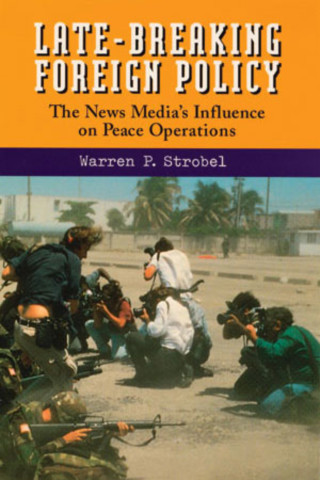Late-Breaking Foreign Policy
The influence of the media--particularly the "CNN effect"--has dramatically changed the way foreign-policy decisions are made. But there have been few in-depth studies of how televised news reports and newspaper accounts of humanitarian tragedies abroad affect the decision to deploy U.S. forces.
This insightful book by a working journalist examines the media's influence on the deployment--or withdrawal--of U.S. peacekeeping troops to avert humanitarian disasters the world over.
Drawing on interviews with senior U.S. national security officials and the journalists who covered the humanitarian-relief operations in Bosnia, Rwanda, Somalia, Haiti, and northern Iraq, Strobel provides riveting behind-the-scenes accounts of recent peace operations. He describes the conditions in which the media has the greatest, and the least, influence, and offers recommendations to civilian and military leaders on building and maintaining public support in an age of intense media scrutiny.
While recognizing that media can have a powerful effect on process, Warren Strobel carefully and effectively debunks the 'media makes policy' myth in this book
James A. Baker, III, 61st U.S. Secretary of State
A revealing read. Strobel, himself a practitioner of daily 'newsbreak' journalism in the print medium, peels away the veneer of magic around today's global newscasting and offers a glimpse of how policymaking and instant journalism mix.
Ralph Begleiter, CNN
Insiders in the policy and media establishments will see themselves in Late-Breaking Foreign Policy. Consumers of news and policy will never watch 'live' television journalism the same way again.
A useful exploration of the issues raised when CNN intersects with international diplomacy. Strobel's case studies from the post-Cold War crises in Somalia and Haiti are especially instructive. In short, an important contribution to the field.
Johanna Neuman, foreign editor of USA Today and author of Lights, Camera, War: Is Media Technology Driving International Politics?
A well-written piece of research that will completely engage readers interested in the media's place in today's culture.
- Publishers Weekly (June 1997)
The very fluidity and uncertainty of our times make Warren Strobel's thoughtful, perceptive study an important book for policymakers, reporters, and students of foreign policy
Ken Bode, moderator of Washington Week in Review and the John Hughes Professor of Politics and the Media, DePauw University
A revealing read. Strobel, himself a practitioner of daily 'newsbreak' journalism in the print medium, peels away the veneer of magic around today's global newscasting and offers a glimpse of how policymaking and instant journalism mix. Insiders in the policy and media establishments will see themselves in Late-Breaking Foreign Policy. Consumers of news and policy will never watch 'live' television journalism the same way again.
Ralph Begleiter, CNN
Warren P. Strobel
Warren P. Strobel covers intelligence and security in the Journal's Washington bureau. He has traveled with seven U.S. secretaries of state and two presidents. He and his colleagues' work at Knight Ridder Newspapers challenging the Bush administration's case for invading Iraq was featured in the 2018 Rob Reiner movie, “Shock and Awe.” He was White House correspondent and State Department correspondent for the Washington Times and is the author of articles in American Journalism Review and the Christian Science Monitor. He was a fellow at the United States Institute of Peace in 1994-95.

